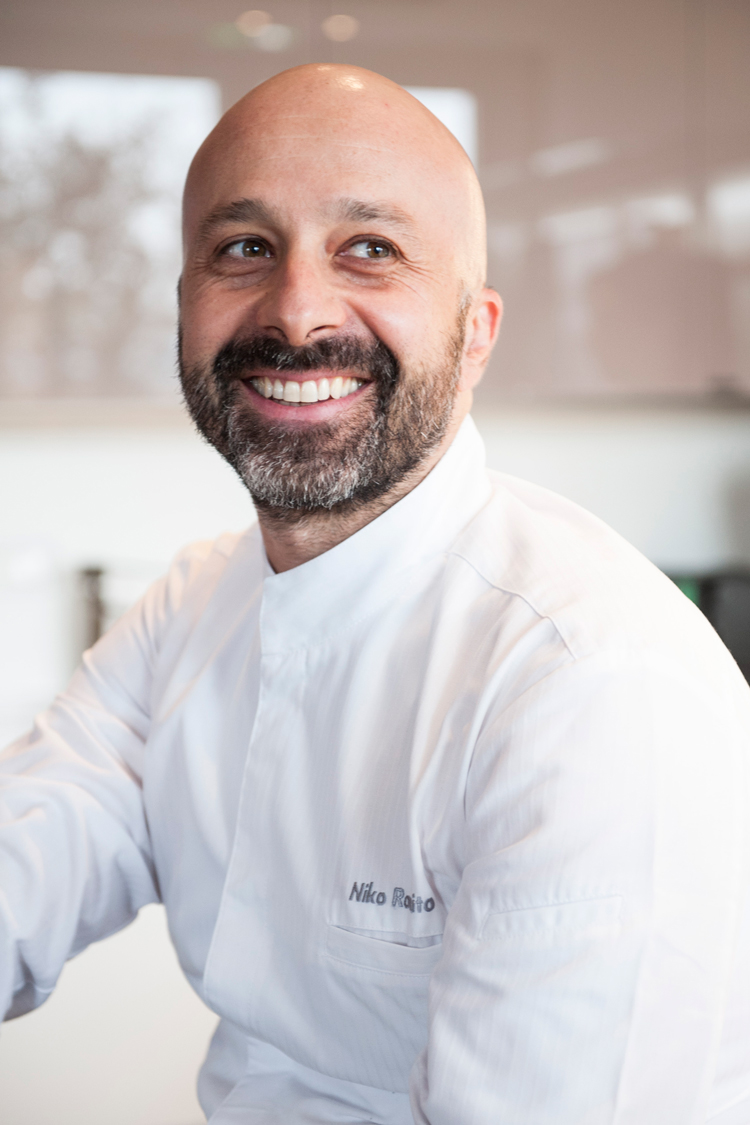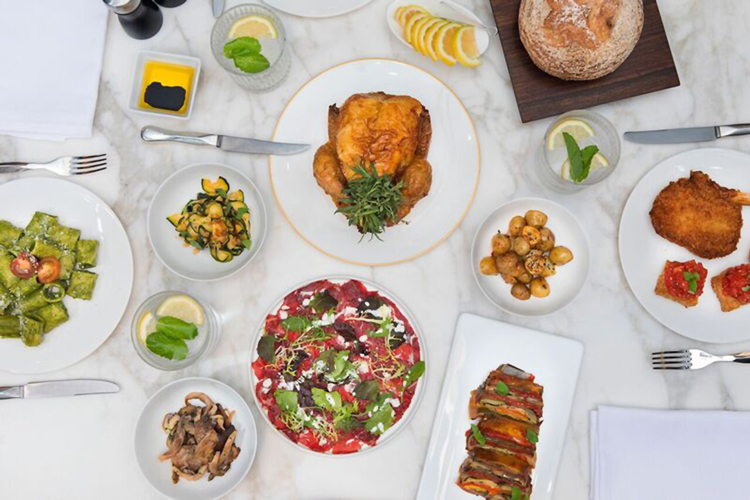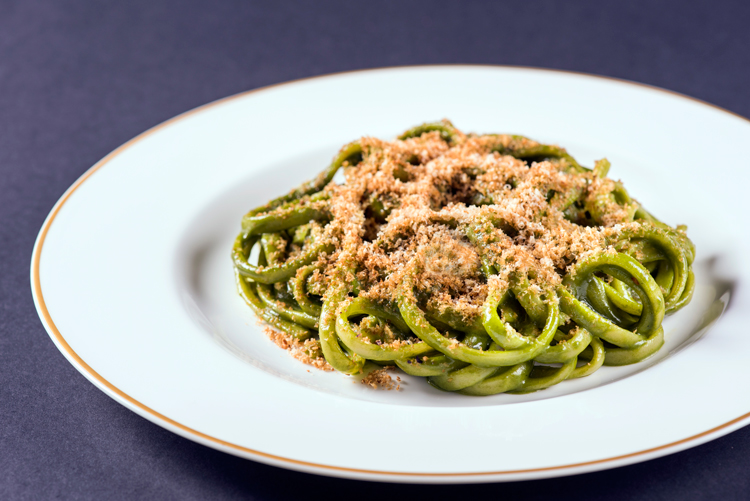MICHELIN STAR CHEF NIKO ROMITO BRINGS HIS CONTEMPORARY ITALIAN CONCEPT TO THE BVLGARI HOTEL & RESORT DUBAI.
Niko Romito, one of the world’s most celebrated chefs, with 3 Michelin stars for his Reale restaurant in Abruzzo, has been busy cooking up something exciting, and truly unique for the Bvlgari Hotel Group.
Since first being approached, his aim was to create a new dining concept which, while preserving the fundamental philosophy of simplicity, is a true refelction of contemporary Italian cooking that expresses the culture, elegance and vitality of ‘Made in Italy’ to the maximum.
Rolling it out in Milan, Beijing, Shanghai, and now Dubai, visitors to the modern restaurant space will experience the same highly skilled menu that brings together all the traditional favourites with a twist, paying particular attention to lightness and structure.
Romito was born in Castel di Sangro, and as a boy dreamed of becoming a stock broker and he attended high school and university in Rome. He frequently travelled back to Rivisondoli, where his father had opened a pastry shop in 1970, converted thirty years later into a restaurant – the original “Reale”.
With only a handful of exams standing between him and a degree in Economics, his father fell ill. Upon his father’s death Romito abandoned his studies and decided to attempt a career as a chef. In the year 2000, together with his sister Cristiana, with no concrete culinary experience and no training, he took over the management of the Reale.
In 2007, he earned his first Michelin star, quickly followed by the second in 2009. In 2011, brother and sister Romito made a bold move and decided to relocate the restaurant to Casadonna, a 16th century monastery close to the village of Castel di Sangro. Besides the restaurant, the historic complex hosts a boutique hotel as well as a professional cooking school (Niko Romito Formazione). Over the years they received many international distinctions. The third Michelin star arrived at the end of 2013.
With such an unconventional rise to success as one of the most recognised Italian chefs, we speak to Romito about his work with Bvlgari, what it takes to be at the top of your game and his hopes for the future.
Why did you decide to workwith the Bvlgari group?
It was the project and the philosophy that lies behind it, because its global and Italian at the same time. It’s the first project with Italian cuisine where the same format is repeated around the world. The idea is to show simple and authentic Italian cuisine. When Bvlgari proposed this project, it was easy to say yes, I had this system and idea in my mind already. The restaurant that I have in the mountains is isolated from the big cities, it was a monastery from the 15th Century that we renovated, and as well as the restaurant we have a cooking academy where we teach Italian cuisine. It’s been running it for seven years. So when Bvlgari came to me having all the human resources from the academy was an opportunity to grow these people out of the academy and be part of the project.
Does this help the quality control across the project?
Absolutely. There are key figures that have worked and studied this project with me for two years. The most important thing is that this menu is conceived and studied for Bvlgari. What you eat here is different from my restaurant, the philosophy is the same, but the cuisine is more classic. It is more casual, a cuisine that I won’t define as fine dining but it’s a meal you can have every day, we are very attentive on the lightness, and the Italian raw materials are true protagonist. Even when you look at the dish, it looks simple but it doesn’t mean it was easy to make.
How do the dishes differ from other fine dining concepts?
I want the dish to be the protagonist and not the chef. Very often many people judge the dish by looking at it, but my cuisine has to be eaten. They have a different feel to other models of fine dining where there are too many decorations or sauces, the aesthetic of my dishes are the ingredients. It’s much harder to cook with one or two ingredients.
What can guests expect from the menu?
They will find plates of Italian traditions, but those plates are cooked with new techniques. On top of the great classics you’ll find new dishes.
What is your signature dish?
One of the dishes that we have studied a lot, and you think of it as a domestic dish, is lasagne. Also the veal Milanese. One of the bestsellers across all the Bvlgari Hotel’s is the antipasto Italiano, a selection of small portions to share that represent Italy through the regions they come from.
Dubai isn’t short of fine dining options, what makes this restaurant stand out?
This is my style and got me to where I am, but the most important thing is I didn’t create this concept to differentiate myself from others, because this is the only cuisine that I like and this is my philosophy. I can’t imagine other cooking models aside from this one. You can adjust to the place where you are, but you can’t change your personality.
You have three Michelin stars to your name, does that add extra pressure?
No but they do add the want and the will to grow more. Two weeks after opening in Shanghai, we received a Michelin star – with the same menu that you will have in Dubai. The value and the difficulty of this project was to have the exact same menu and it’s interesting to see how the reaction to the dishes differs depending on where you are.
What do the customers in Dubai tend to go for?
In Dubai, there are a lot of requests for meat, and stuffed pasta like Ravioli. The palette also differs, in Dubai they prefer a spiced kitchen with stronger flavours, in China it has to be less.
And does being a chef mean you are always in charge of cooking at home?
I never cook at home. I never cook outside the restaurant and I love people that cook for me.
What is your ultimate indulgence?
I have very simple tastes. Buffalo mozzarella and warm bread with olive oil.
Do you find it hard not to critique when you eat out?
No but a very few times I’ve eaten out people were worried that I would criticise, but I enjoy going out. When the recognise me, especially the young chefs, they start panicking.
Do you think more restaurants are looking to simplify their cooking, is this a trend?
It’s not so much to follow or set a trend. This project is based on bringing true Italian cuisine, and it requires time because a Bvlagri guest is a sophisticated, well-travelled and demanding and our goal is for this project to be understood and have people coming back.
How would you define modern Italian cuisine?
Italian cuisine is a domestic cuisine, the traditional “trattorias” originate from the recipe’s passed on from generations in the Italian houses. Modern Italian cuisine has to be able to maintain this heritage by revising the multitude of recipes with the lens of contemporaneity, the innovative cooking and transformation techniques deriving from research, preserving the taste and improving the nutritional impact on the diners.
What other chefs do you admire?
David Kinch, Massimo Bottura, Renè Redzepi, Christian Puglisi, Mauro Uliassi and many other young Italian chefs that today are bringing on a strong identity concept of our cuisine.
What is your first cooking memory?
I remember my grandfather very well, cooking for me and my sisters the traditional abruzzesi dishes when we spent time in Rivisondoli, my hometown, during the summer holidays when we moved back from Rome. Another strong memory is the smell of my father’s pastry shop which is the inspiration that has given shape to BOMBA, today one of my favourite gastronomic street food formats.
What do you say ‘no’ to?
Compromise.
What do you still hope to achieve?
I want to consolidate and perfect all the projects developed so far, endeavour in the research processes that are always ongoing in the labs we have at Casadonna and Reale and continue to improve transformation and cooking techniques. The variety of the Italian cuisine traditions and heritage are extremely broad, and is an endless stimuli and source to draw inspiration from.


















